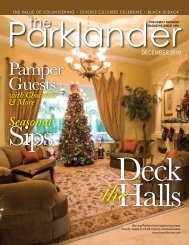Cover_Jan 05 (Page 2) - The Parklander Magazine
Cover_Jan 05 (Page 2) - The Parklander Magazine
Cover_Jan 05 (Page 2) - The Parklander Magazine
- No tags were found...
You also want an ePaper? Increase the reach of your titles
YUMPU automatically turns print PDFs into web optimized ePapers that Google loves.
Stress Relief<br />
By Marcy DiMare<br />
Gardening is theraputic and one<br />
of the best stress-busters, especially now<br />
with this beautiful weather. After a hard<br />
day at the office, puttering for an hour<br />
in your garden or even just sitting there<br />
and looking around is an ideal way to<br />
unwind. It is wholly absorbing and any<br />
gardener who says she or he has never<br />
gone out into the garden and lost all<br />
track of time is either being economical with the truth<br />
or is not a real gardener.<br />
This is a stress-free activity that forces you to slow down<br />
to the pace of the natural world, the pace at which we all<br />
lived until very recently in our history. Being in a garden,<br />
surrounded by beautiful plants, calms the mind and soothes<br />
and lifts the spirits.<br />
Gardening is also very good for you physically. It is<br />
a valuable form of exercise, provided you do not proceed too<br />
aggressively. It works all the main muscle groups and also<br />
gives your heart and lungs a good workout. Did you know<br />
that men and women burn more calories per minute digging<br />
or hedge trimming than they do cycling and only slightly<br />
fewer they do swimming And unlike other forms of exercise,<br />
which are an end in themselves and can become boring very<br />
quickly, gardening has a tangible end product — a beautiful<br />
garden and delicious home-grown products — as well<br />
as benefits to health.<br />
One of the greatest gardening pleasures is growing herbs<br />
and using them fresh from the garden. Since the very earliest<br />
times, we have used herbs not only for food but also for<br />
healing. Every civilization of the past — Egyptian, Greek,<br />
Roman and Mayan — used plants, sometimes in very<br />
sophisticated ways, to heal wounds, cure disease, deaden<br />
pain, lift the spirits and balance the mind. In China and<br />
India the traditions of herbal medicine remain unbroken and<br />
plants and techniques used for 5,000 years are still in use<br />
today. We now grow many herbs in gardens or containers,<br />
not only for their usefulness but for their beauty.<br />
Your garden<br />
can also be your<br />
pharmacy. For<br />
thousands of years,<br />
plants have been<br />
used for medicinal<br />
purposes, and<br />
though herbal<br />
medicine has been out of favor<br />
in the West for the last 200<br />
years, there is a growing revival<br />
in it and other complementary<br />
therapies – aromatherapy and<br />
flower remedies, for example.<br />
Herbal remedies are<br />
potentially very powerful and<br />
should be treated with great<br />
respect. Natural doesn’t mean<br />
harmless. <strong>The</strong> standard culinary<br />
Nasturtium<br />
herbs are safe to ingest in the<br />
usual ways, but before you take<br />
anything else from the garden<br />
you should always ask a practitioner.<br />
St. John’s Wort comes to<br />
mind. Teas made with 1-2 cups<br />
of flowers per one cup of boiling<br />
water are recommended for<br />
depression. If you have high<br />
blood pressure, you must be<br />
checked weekly if you take<br />
the herb regularly.<br />
Where you grow medicinal<br />
plants, whether in mixed borders<br />
or in separate herb beds or<br />
Aloe Plant<br />
gardens, depends on how much<br />
you like herbs and how you<br />
plan to use the area. If the herbs<br />
are primarily for the kitchen,<br />
and after all, eating them is an<br />
excellent way of taking your<br />
medicine, it makes sense to site<br />
them as close to the kitchen<br />
door as practical. On the other<br />
hand, if you want the herb<br />
garden to be a fragrant retreat,<br />
somewhere to escape to, then<br />
a sunny site at the bottom of<br />
the garden would be ideal. Try<br />
basil, dill, chives, rosemary,<br />
parsley, tarragon, thyme, sage,<br />
St. John’s Wort<br />
marjoram and garlic. Wonderful<br />
flower petals such nastursium,<br />
pansies and roses are terrific in salads.<br />
<strong>The</strong> medicinal properties of aloe vera have been known<br />
and recorded since biblical times. <strong>The</strong> semi-tropical Aloe<br />
plant is 95 percent water. It has been used for a variety of<br />
ailments and as an ointment for burns, cuts and rashes,<br />
as well as an ingredient in various beauty preparations<br />
So rather than take indigestion tablets, pick a handful<br />
of mint and make peppermint tea. Or if you’re finding<br />
it hard to sleep, try chamomile tea or lavender oil on your<br />
pillow last thing at night. Pleasant dreams ... ●P<br />
Marcy DiMare, a Broward County Master Gardener, is president of the<br />
Garden Club of Coral Springs. E-mail her at dimare@theparklander.com<br />
Basil Plant<br />
40<br />
Dill Plant
















